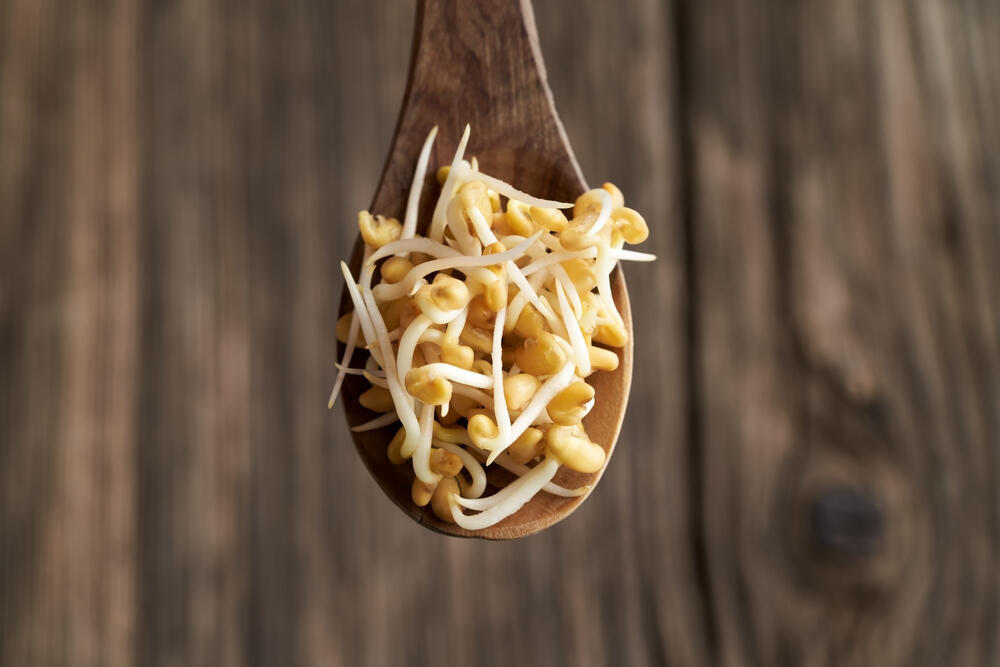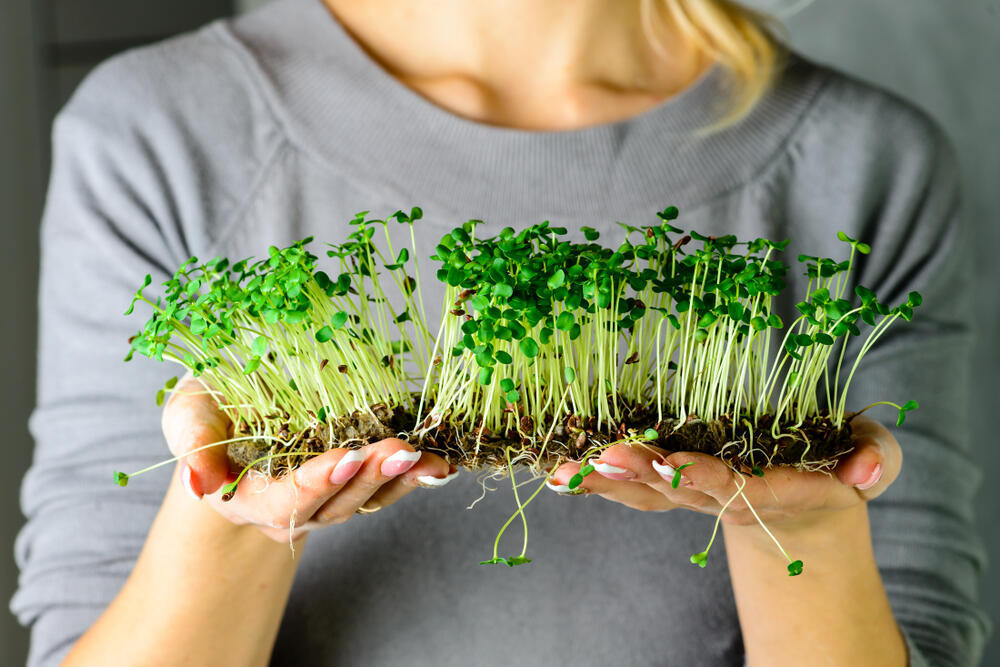Getting your Trinity Audio player ready...
In recent decades, with the growing awareness of the importance of proper nutrition and its impact on our health, sprouted foods have become increasingly popular. The value of the global sprouted food market is currently valued at approximately $4.9 billion as of 2022; this number is expected to reach $12.48 billion by the end of 2032. But is this merely a passing nutritional trend, or do sprouted foods have scientifically proven benefits?
Other stories:
Many of us have fond memories of germinating seeds in preschool or elementary school: placing dried beans on wet cotton wool, and eagerly following the process of a root, followed by a tiny leaf and a stem, emerging in just a few days.
6 View gallery


A variety of seeds can be germinated for consumption
(Photo: JIL Photo, Shutterstock)
The resulting young plant, which includes the seed, radicle (initial root) and beginning of the stem, is called a sprout or seedling. While germination is essential for seeds to develop into mature plants, we can also germinate a range of seeds for consumption. This includes legumes such as lentils, chick peas and beans, through grains such as wheat and even nuts such as almonds.
Sprouts can be consumed raw, added to salads and smoothies, or cooked and enjoyed as a nutritious addition to meals. Consumption of sprouts is particularly popular among those who advocate raw veganism - vegan nutrition without processing or heating.
Before we continue, it’s worth noting that the types of foods that can be germinated are considered beneficial for our health, regardless of the effects of sprouting. These include mostly legumes, which are rich in dietary fiber and protein that contribute to the feeling of satiation over time, while whole grains are considered an excellent source of Vitamin E and the Vitamin B complex.
How is a sprout born?
To determine whether sprouted food is healthier than unsprouted food, we must compare the nutritional value of sprouted seeds to that of the same type of seed that has not been sprouted. For this purpose, it’s important to first understand what happens to the seed when it sprouts.
A seed usually consists of three main components: the seed coat, endosperm (food reserve) and embryo, which will eventually develop into a plant. The food reserve constitutes the nutritional material that will be used by the embryo during germination: carbohydrates, proteins and fats, the proportions of which vary among different types of seeds.
6 View gallery


Germination enhances the bioavailability of certain nutritional components
(Photo: Evtushkova Olga, Shutterstock)
Grains contain mainly carbohydrates, legumes contain mainly proteins, and nuts have a high content of fats. The seed coat provides protection against environmental dangers. The thicker and harder it is, the higher its chances of survival. On the other hand, a seed coat this hard makes it difficult for the radicle to break out of the seed, and the germination rate is slower.
During germination the seed is exposed to humidity, the percentage of water absorbed by it increases, resulting in its ‘awakening’ from a dormant state. This awakening includes many physical and chemical changes, including the weakening of the seed coat, activation of enzymes, breakdown of nutrients and creation of proteins that are used by the seedling during its development.
Since these processes require energy, dedicated enzymes break down the nutritional substance, starch, into monosaccharides, which the seed can use for energy. In addition to the decrease in starch content of the seedlings, their protein and dietary fiber contents increase; in some cases, the composition of vitamins and minerals also changes.
For instance, a 2012 study that examined the nutritional profile of mung beans found that the concentration of Vitamin C in mung beans increased almost 24-fold during germination.
In contrast, in whole grain sprouts, there is an increase in the concentration of free amino acids, which serve as the building blocks for proteins. Another example is broccoli sprouts, which after germination were found to contain the molecule sulforaphane at a concentration 15 times higher than that in mature broccoli.
Nevertheless, relying solely on chemical analysis of food components to determine whether an examined food does indeed confer nutritional benefits, may not be enough. The reason for this is that not all nutritional components are absorbed equally by our bodies. The ratio between the amount of a certain food component absorbed by our body and the initial amount of that component in the food is defined by nutritionists as bioavailability.
Phytic acid, for example, which is a compound containing most of the phosphorus in seeds, often has a negative effect on the absorption of minerals during digestion, since it tends to bind to minerals such as iron, calcium and magnesium, thus reducing their absorption.
In other words, phytic acid may reduce the bioavailability of these minerals, although studies show that this may not always be the case. Phytic acid can also reduce the risk of kidney stones and has antioxidant activity. After germination, the amount of phytic acid in the seed decreases.
Watch out, infiltrating bacteria
And what about the health benefits? Despite the claims that sprouts can help improve the condition of people on the autism spectrum, or treat or prevent diseases such as cancer, Alzheimer’s, dementia, and diabetes, there is a lack of large, qualitative studies on humans that provide evidence for these claims. While germination can increase the nutritional value of seeds, and may help in cases of nutritional deficiencies, it is important to note that sprouts are not a cure-all or a substitute for medical treatment.
However, consumption of raw sprouts may have negative health effects. One of the concerns associated with eating sprouted food is the risk of bacterial infection, since sprouts are often consumed raw without being cooked.
The germination process, which involves high humidity and temperatures that can encourage the growth of a wide range of bacteria, may encourage their development.
Between 1996 and 2016, for example, there were at least 48 outbreaks of food poisoning in the U.S. linked to sprout consumption. These incidents affected close to 2,500 people and resulted in three deaths.
In 2011, an outbreak of E. coli poisoning in Germany led to the deaths of 51 individuals, which were caused by the release of Shiga toxin by the bacterium. An epidemiological investigation revealed that the source of the poisoning was fenugreek sprouts grown on an organic farm and sold to cafés and restaurants in Germany.
6 View gallery


Broccoli sprouts, while rich in nutrients and substances that are considered healthy, can also harbor bacteria that cause food poisoning
(Photo: Madeleine Steinbach, Shutterstock)
Improper growing conditions, supply chain errors and inadequate storage can also lead to the proliferation of bacteria in other fruits and vegetables, such as lettuce, strawberries and cucumbers. However, the danger of bacterial infection is considerably greater in sprouts, which are classified as a food that has a high probability of causing food poisoning.
Sprouts are grown in a warm and humid environment that is also ideal for bacterial growth. Even if only a few seeds are contaminated with single bacteria, the growing conditions will allow them to multiply and reach life-threatening levels, contaminating the other sprouts and the environment.
For this reason, some nutrition scientists completely avoid raw sprouts, and health organizations recommend that people who are susceptible to infections - such as pregnant women, children, the elderly and immunocompromised individuals - not eat uncooked sprouts.
Whether you buy sprouts or choose to germinate seeds yourself, it’s important to be careful: consume the sprouts while they are fresh, store them refrigerated to extend their shelf life, and whenever possible, consume them well-cooked.
Do it yourself
If you decide to consume sprouts you can easily grow them yourself. If you want to try germinating there is no need for sophisticated tools or extraordinary means.
There are several ways to sprout seeds; some using soil as a growth medium, while others are based on water alone. The basic process involved soaking the seeds in water for several hours, then transferring them to a sieve and covering them with a towel to maintain a moist environment that encourages germination.
It’s recommended to pour water through the sieve from time to time, but don’t overdo it, to avoid “drowning” the seeds in the water and causing them to rot. The exact germination time varies depending on the type of seed, but the radicle usually emerges from the seed within a few days.
Please note that since the seeds are often the main source of sprout contamination, home-growing does not guarantee protection against bacteria, and it is recommended not to consume raw sprouts, especially if you belong to a high-risk group.
Content distributed with permission from Davidson Institute of Science Education




